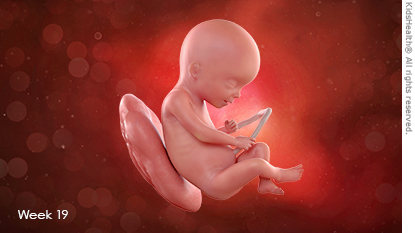- Home
- Humana Medicaid
- Kentucky Medicaid
- Medicaid extras
- Health and wellness
- Parents Home
- Para Padres
- A to Z Dictionary
- Allergy Center
- Asthma
- Cancer
- Diabetes
- Diseases & Conditions
- Doctors & Hospitals
- Emotions & Behavior
- First Aid & Safety
- Flu (Influenza)
- Food Allergies
- General Health
- Growth & Development
- Heart Health & Conditions
- Homework Help Center
- Infections
- Newborn Care
- Nutrition & Fitness
- Play & Learn
- Pregnancy Center
- Preventing Premature Birth
- Q&A
- School & Family Life
- Sports Medicine
- Teens Home
- Para Adolescentes
- Asthma
- Be Your Best Self
- Body & Skin Care
- Cancer
- Diabetes
- Diseases & Conditions
- Drugs & Alcohol
- Flu (Influenza)
- Homework Help
- Infections
- Managing Your Weight
- Medical Care 101
- Mental Health
- Nutrition & Fitness
- Q&A
- Safety & First Aid
- School, Jobs, & Friends
- Sexual Health
- Sports Medicine
- Stress & Coping
Pregnancy Calendar: Week 19
Your Baby's Development
Your baby is now covered with a white, waxy substance called vernix caseosa,which helps prevent delicate skin from becoming chapped or scratched. Premature babies may be covered in this cheesy coating at delivery.

Your baby is still tiny, but this week brings the development of brown fat, which will help keep your baby warm after birth. During the last trimester, your baby will add more layers of fat for warmth and protection.
Your Body
You might feel your baby's first movements. This often happens between weeks 18 and 20. These first movements are known as quickening, and they may feel like butterflies in your stomach or a growling stomach. Later in your pregnancy, you'll feel kicks, punches, and possibly hiccups! Each baby has different movement patterns, but if you're concerned or if the movements have decreased in frequency or intensity, talk to your doctor.
Many women wonder around this time whether having sex will hurt their developing baby, and the answer is no. Sex is considered safe at all stages of pregnancy, as long as your pregnancy is normal. But that doesn't necessarily mean you're going to want to have it. Many expectant women find that their desire for sex fluctuates during the various stages of pregnancy, depending on their fatigue, growing size, anxiousness over the birth, and a host of other body changes. Keep the lines of communication with your partner open as these issues come up. Even though you may both be preoccupied with the baby, it's also important to have some "together time."

© 1995- The Nemours Foundation. KidsHealth® is a registered trademark of The Nemours Foundation. All rights reserved.
Images sourced by The Nemours Foundation and Getty Images.

